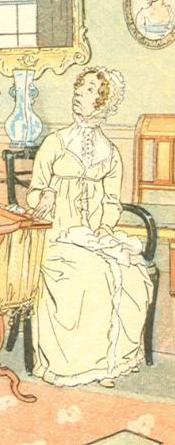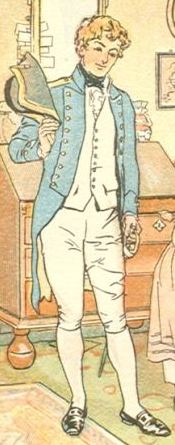James Edward Austen-Leigh wrote in his memoir of his aunt Jane Austen, “She certainly took a kind of parental interest in the beings whom she had created, and did not dismiss them from her thoughts when she had finished her last chapter. … She would, if asked, tell us many little particulars about the subsequent career of some of her people.” (Memoir of Jane Austen, Ch. 10) Fans of Jane Austen continue to be intrigued by the other side of the story and the what happened next? of her novels, provoking and encouraging the large and increasing number of Jane Austen fanfiction “with which the press now groans”1 (to use a quotation from Northanger Abbey). We are eager for more details.
In his A Fine Brush on Ivory, Richard Jenkyns points out the loveless state that Mansfield Park‘s Mrs. Norris is in. “Mrs. Norris has nobody to love her, or even to care for her. We never learn her Christian name; why should it ever be wanted?”2 In general, I agree with Mr. Jenkyns’s perspectives on Mansfield Park, but Mrs. Norris joins a multitude of unnamed characters in Jane Austen’s canon — the Rev. Mr. Norris, Mrs. Grant, Dr. Grant, Mr. Price (MP); Mr. Perry, Mrs. Bates, Mrs. Goddard, Mr. Weston (E); Mr. Allen, Mrs. Allen, General Tilney, Mrs. Morland (NA); Admiral Croft, Captain Harville, Mrs. Harville (P); Colonel Forster, Colonel Fitzwilliam, Mrs. Gardiner, Lady Lucas (P&P); Colonel Brandon, Mrs. Dashwood, Mrs. Jennings (S&S); &c. — and I don’t see any reason to think that Jane Austen had some more significant reason for not giving Mrs. Norris a first name than she did in not giving one to any of these others.
Anyway, I have my own theory on Mrs. Norris’s name. I conjecture that it was Elizabeth. Children in Jane Austen’s stories were usually named after their parents and other relations. For example, Fanny Price has her mother’s name. Maria Bertram has her mother’s name. Tom Bertram is named for his father. In Emma, John and Isabella Knightley name their first son Henry after Isabella’s father, their second son John after his father, their daughter Bella must be named for her mother, George is named for his father’s brother, and baby Emma is named for her mother’s sister. Mrs. Weston’s name is Anne, and her little girl is named Anna. Jane Fairfax has her mother’s name. &c., &c.
Mrs. Price’s last two children, Charles and Betsey, were born after her reconciliation with her sisters. She already had a son Tom, so she couldn’t name another child after Sir Thomas. So, my theory is, she named Betsey after Mrs. Norris. Mrs. Norris, after all, ended up with much of “the credit of projecting and arranging so expensive a charity” (ch. 1) as bringing Fanny to Mansfield, and she was Betsey’s godmother.3
And if no one else agrees with this theory, “the credit of a wild imagination will at least be all my own” (NA, Ch. 30). Well, not quite my own. In So You Think You Know Jane Austen?: A Literary Quizbook, John Sutherland and Deirdre Le Faye wrote, “Mrs Norris is the godmother of Betsey (an act following the reconciliation of the sisters), which perhaps indicates that Mrs Norris’s Christian name is Elizabeth. But she has never seen the child, nor sent her any gift.”4
_____________________
1 “Let us leave it to the reviewers to abuse such effusions of fancy at their leisure, and over every new novel to talk in threadbare strains of the trash with which the press now groans.” (Northanger Abbey, Ch. 5)
2 Richard Jenkyns, A Fine Brush on Ivory (Oxford: Oxford University Press, 2004), ch. 4, p. 98.
3 “‘Now, Susan,’ cried Mrs. Price, in a complaining voice, ‘now, how can you be so cross? You are always quarrelling about that knife. … Poor Mary little thought it would be such a bone of contention when she gave it me to keep, only two hours before she died. … It was the gift of her good godmother, old Mrs. Admiral Maxwell, only six weeks before she was taken for death. … My own Betsey’ (fondling her), ‘you have not the luck of such a good godmother. Aunt Norris lives too far off to think of such little people as you.’
“Fanny had indeed nothing to convey from aunt Norris, but a message to say she hoped that her god-daughter was a good girl, and learnt her book. There had been at one moment a slight murmur in the drawing-room at Mansfield Park about sending her a prayer-book; but no second sound had been heard of such a purpose. Mrs. Norris, however, had gone home and taken down two old prayer-books of her husband with that idea; but, upon examination, the ardour of generosity went off. One was found to have too small a print for a child’s eyes, and the other to be too cumbersome for her to carry about.” (Mansfield Park, Ch. 38)
4 John Sutherland and Deirdre Le Faye, So You Think You Know Jane Austen?: A Literary Quizbook (Oxford: Oxford University Press, 2005), page 173.




